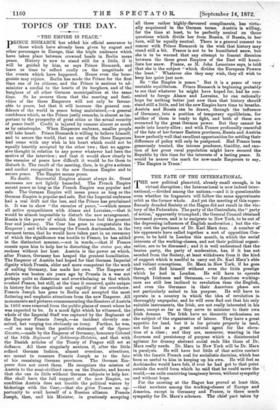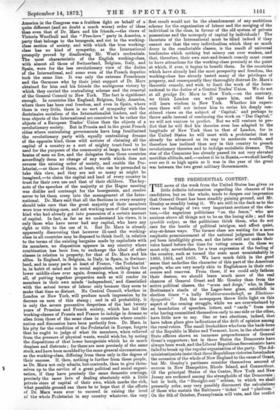THE FATE OF THE INTERNATIONAL. T HE new political planetoid, already
small enough, is ha virtual disruption ; the International is now indeed inter- national,—divided among the nations,—and it is questionable- even whether its fragments will follow the same approximate orbit as the former whole. And yet the meeting of this super- fluously dreaded Society at the Hague did not result in the vic- tory of the Federalists. The party of the Centralists, the" party of action," apparently triumphed; the General Council obtained' 'increased powers, and is to emigrate to New York, to be out of the depressing influences of English moderation ; but the vic- tory cost the partisans of Dr. Karl Marx dear. A number or his opponents have called together a sort of opposition Con- gress, to be held in London this month, in which the social interests of the working-classes, and not their political organi- sation, are to be discussed ; and it is well understood that the beaten party, the party of moderation, has, if it has not. seceded from the Society, at least withdrawn from it the kind. of support which is needful to carry out Dr. Karl Marx's able- and valiant conceptions. Dr. Marx in New York, if he goes. there, will find himself without even the little prestige- which he had in London. He will have to operate- through Irishmen and Germans, — for American working- men are still less inclined to revolution than the English, and even the Germans in their American phase are not particularly suited to his purpose. He will have to. operate in a country in which the idea of revolution is. thoroughly unpopular, and he will soon find out that his only suitable instruments, the Irish, are not really interested in his plans, except so far as they serve to minister to their own. Irish dreams. The Irish have no theoretic enthusiasm ork the subject of the organisation of labour. They have a great appetite for land, bat it is for private property in land,„ not for land as a great natural agent for the eleva- tion of a class ; and they are, moreover, wanting in the. dourness and persistency of purpose which a disinterested agitator for dreamy abstract social ends like those of Dr.. Marx really needs. Dr. Marx in New York will be Dr. Maim in paralysis. He will have bat little of that active contact with the fanatic French zeal for socialistic doctrine, which has. been so useful-to him in keeping up his own. He will feel as Archimedes would have felt, if ever he had got to that point outside the world from which he said that he could move the world,—an exile contriving imaginary levers, without sympathy and without hope.
For -the meeting at the Hague has proved at least this; —that nowhere among the working-classes of Europe and America, except in Germany and France, is there much sympathy for Dr. Marx's schemes. The chief part taken by America in the Congress was a fruitless fight on behalf of a quite different (and no doubt a much worse) order of ideas than even that of Dr. Marx and his friends,—the views of Victoria Woodhull and the "Free-love" party in America, a party that belongs to the bourgeois, and not to the working- class section of society, and with which the true working- class has no kind of sympathy, as the International promptly proved by disallowing Mr. West's credentials. The most characteristic of the English working-class, with almost all those of Switzerland, Belgium, Italy, and Spain, were for the less revolutionary view of the duties of the International, and some even of the French deputies took the same line. It was only the extreme Frenchmen and the Germans who by their joint support of Dr. Marx obtained for him and his friends the ambiguous victory by which they carried the centralising scheme and the removal of the General Council to New York. The fact is significant enough. In countries like England, Belgium, Italy, America, where there has been real freedom, and even in Spain, where there is very little, there is no sort of sympathy with the doctrinaire socialism of the Internationalist leaders, and the true objects of the International are conceived to be rather the objects of a European Trades' Union than the objects of a revolutionary society. But in Prussia and in the great French cities where centralising governments have long familiarised the revolutionary party with equally centralising dreams of the opposite kind, these wild notions of claiming all the capital of a country as a sort of mighty trust-fund to be used for the purposes of the community at large, have set the brains of men on fire, and the delegates from these countries accordingly deem no change of any worth which does not reverse the existing order of society, and enable the Pro- letariat,—or those of them, at least, who can be persuaded to take this view, and they are not so many as might be imagined,—to claim the capital and land of every country in trust for their own use and that of their children. The key- note of the speeches of the majority at the Hague meeting was dislike and contempt for the bourgeoisie, and resolve never to let them creep into the management of the Inter- national. Dr. Marx said that all the Sections in every country should take care that the great majority of their members were true working-men, and not working-men of that spurious kind who had already got into possession of a certain amount of capital. In fact, as far as we understand his views, it is only those who have never had any capital, who have any right or title to the use of it. But Dr. Marx is already apparently discovering that however ill-used the working- class in all countries may be disposed to think itself, in relation to the terms of the existing bargains made by capitalists with its members, no disposition appears in any country where combination has been free, to exchange the ideal of other classes in relation to property, for that of Dr. Marx and his allies. In England, in Belgium, in Italy, in Spain, in Switzer- land, and in many parts at least of France, the Proletariat' is, in habit of mind and in social aspiration, nothing but the lower middle-class over again, dreaming, when it dreams at all, of putting together properties such as will render its members in their own minds independent,' and dissatisfied with the actual terms of labour only because they seem to make that time so distant. No Central Council, whether in London or New York, will produce much impression by its decrees on men of this stamp ; and in all probability, it is only the severe preventive despotism of the last twenty years of Prussian and French society, which has led the working-classes of Prussia and France to indulge in dreams so alien from those of the same class in countries where combi- nation and discussion have been perfectly free. Dr. Marx, in his pity for the condition of the Proletariat in Europe, forgets that he ought to judge of what its members, when relieved from the pressure of physical wants, would wish for, by noting the dispositions of that lower bourgeoisie which he so much despises and distrusts ; for these are men precisely of the same stock, and have been moulded by the same general circumstances, as the working-class, differing from them only in the degree of their success. If, then, nothing is further from these people, as Dr. Marx not only admits, but contends, than to give them- selves up to the service of a great political and social organi- sation. if they have precisely the same domestic cravings, precisely the same love of dealing absolutely with a little private store of capital of their own, which marks the rich, what possible ground can there be to hope that if the efforts of Dr. Marx were ever to succeed in raising the level of the whole Proletariat in any country whatever, the very first result would not be the abandonment of any ambitious scheme for the organisation of labour and the merging of the individual in the class, in favour of the old system of private possessions and the monopoly of capital by individuals ? The theorists of the International must be blind indeed if they cannot see that the very individualism which they so much decry in the comfortable classes, is the result of universal tendencies which nothing but misery can ever weaken, and that, therefore, their own root-and-branch remedy must cease to have attractions for the working-class precisely at the point at which, if ever, it begins to benefit them. In the countries which have already had the most prosperity and freedom, the working-class has already tasted many of the privileges of property, and consequently they thoroughly distrust Dr. Marx's theoretic remedy, and wish to limit the work of the Inter- national to the duties of a Central Trades' Union. We do not at all grudge Dr. Marx to New York,—on the contrary, we think London can well spare him, and that he will learn wisdom in New York. Whether his experi- ence there will not induce him to revise his deeply con- sidered views on the subject of Capital,' and perhaps to throw aside instead of continuing the work on "Das Capital," we will not venture to predict. But we will venture to pre- dict that he will find his theories even less adapted to the longitude of New York than to that of London, for in the United States he will meet with a proletariat that is already far advanced on its way to moderate wealth, and therefore less inclined than any in this country to preach revolutionary theories and to indulge socialistic dreams. The star of the Commune has already passed its not very elevated meridian altitude, and,—unless it be in Russia,—we shall hardly ever see it so high again as it was in the year of the great war between the two great military Governments.



































 Previous page
Previous page